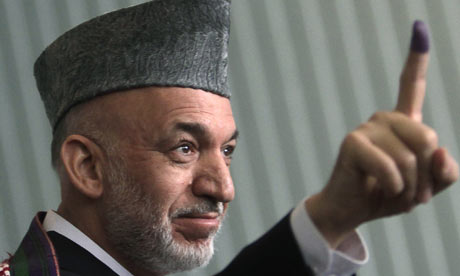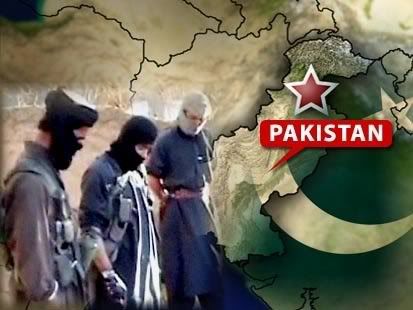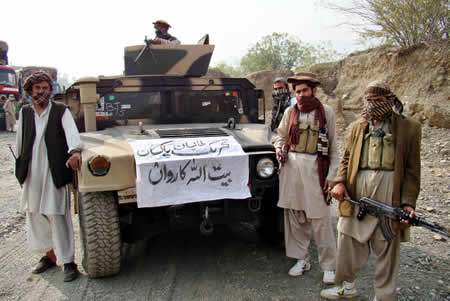 In my post last week, I predicted that Afghanistan's Presidential election last Thursday would not go smoothly. In fact, Afghanistan now faces all of the challenges I outlined: legitimacy concerns, fraud allegations, and continued violence. During the election on Thursday alone, Taliban militia sought to disrupt the voting process by launching a number of attacks that caused polling centers in the South and East to be closed. They also made good on their threat of cutting off the inked fingers of voters in certain areas, specifically women. But, election day violence by the proclaimed enemies of the state is the least of Afghanistan's concerns.
In my post last week, I predicted that Afghanistan's Presidential election last Thursday would not go smoothly. In fact, Afghanistan now faces all of the challenges I outlined: legitimacy concerns, fraud allegations, and continued violence. During the election on Thursday alone, Taliban militia sought to disrupt the voting process by launching a number of attacks that caused polling centers in the South and East to be closed. They also made good on their threat of cutting off the inked fingers of voters in certain areas, specifically women. But, election day violence by the proclaimed enemies of the state is the least of Afghanistan's concerns.
The largest threat to stability, progress, and viability of a democratic system in Afghanistan is legitimacy of the government. Simply put, if people don't believe the elections are legitimate (voting fraud, electioneering, etc.), they will not hold the government to be legitimate. If the government is seen to be fraudulent, the
democratic system will fail and violence will consume that which we have already put so much blood, sweat, and tears into building. Since last Thursday, many allegations have come out about voting fraud. Even the UN is saying that a large portion of votes cast may be fraudulent.
The immediate impact of fraud claims is best exemplified by Iran's Presidential election in June wherein mass protests broke out following the election prompting a months long violent and bloody crackdown on political opposition. A bloody and oppressive crackdown by the government isn't a possibility in Afghanistan because that kind of reaction would completely destroy any legitimacy the government would have had. However, some of the losing candidates are planning to organize mass protests while the leading challenger has previously threatened the same. The likelihood of these protests turning violence, especially if radicals or militants were to show up, is very high.
The gut check here is foreboding. An early release of polling data indicates Karzai has won last Thursday's election in a relative landslide (72% of the vote so far compared to 23% of his biggest challenger). However, that data appears to be inaccurate as this AP article indicates that Karzai and his top challenger, Abdullah Abdullah, both have around 40% of the nationwide vote and are headed for a runoff. Unfortunately, a runoff presents a situation that must be scrutinized heavily. If Karzai were to gain a large margin in the vote, it will literally fodder for fraud claims. If the fraud claims aren't handled correctly, independently investigated, and cleared by the UN, things could get very ugly and the consequences for the US's strategy could be dire. As it stands, like an ominous cloud on the horizon, there are almost certainly going to be protests in the coming days and weeks. The only question is will they be big enough and worked up enough to turn violent?

 Here in the US, Wednesday the 19th is winding down. In Afghanistan, Wednesday the 19th has already happened. It is a funny thing to think that a place half the world away is experiencing what we would consider the future. However, in the early hours of election day in Afghanistan (it is after 1 am on Thursday the 20th at the time of this writing), two things have become clear: there will be
Here in the US, Wednesday the 19th is winding down. In Afghanistan, Wednesday the 19th has already happened. It is a funny thing to think that a place half the world away is experiencing what we would consider the future. However, in the early hours of election day in Afghanistan (it is after 1 am on Thursday the 20th at the time of this writing), two things have become clear: there will be 
 Thursday in Afghanistan promises to be a day of reckoning for not only Hamid Karzai and his government but also for larger Western efforts to turn a state that's existed in a haphazard tribal system for centuries into a functioning democracy. Karzai is running for his second term as Afghanistan's President since he was hand picked by the US, then under President Bush, for his charismatic and strong political nature. However, since he won the first Presidential election in 2004,
Thursday in Afghanistan promises to be a day of reckoning for not only Hamid Karzai and his government but also for larger Western efforts to turn a state that's existed in a haphazard tribal system for centuries into a functioning democracy. Karzai is running for his second term as Afghanistan's President since he was hand picked by the US, then under President Bush, for his charismatic and strong political nature. However, since he won the first Presidential election in 2004, 









